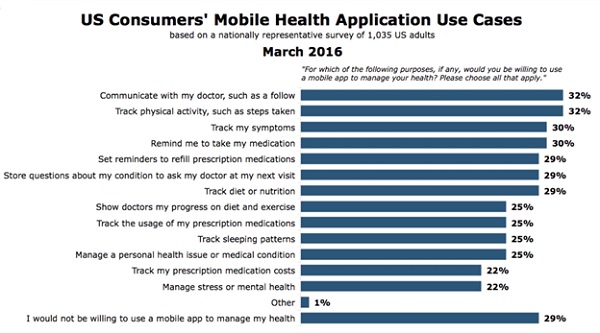The ‘Wild West’ of health apps

Health apps could eventually play a major role in managing health – but more evidence is needed to back up claims and dispel hype, says Richard Meyer.

Richard Meyer
Once again the hype around health apps is in high gear. But before anyone asks for funding to develop a health app, you should leave the hype and focus instead on patient usability and health care professional (HCP) buy-in.
First of all, it's important to understand the difference between a 'health app' and a 'wellness app'. Wellness apps are focused around fitness, calories burned and steps taken. Heath apps, on the other hand, help patients monitor health conditions like blood pressure and glucose. There is a lot more use of fitness apps than health apps right now.
Not too long ago, on behalf of a client, I sat in on some qualitative research with primary care physicians and cardiologists to get feedback on health apps. The bottom line of the research was that, although they felt some apps could be useful for patients, none of them would use app data as diagnostic criteria. Why? Because they want clinical proof that the apps accurately record data and that patients are using them as directed. As one doctor said to me, "how can I be sure that a patient is going to take their blood pressure as requested every day or that the readings are accurate?"
Apple has been expanding its HealthKit on the iPhone but it often requires users to carry their iPhone with them all the time and ensure data is being recorded. There are thousands of health apps out there and the bigger concern should be that patients are using health apps instead of getting good medical advice from a qualified HCP.
Then there are startups that want patients to connect with a doctor over the internet. The downside of this is that these doctors don't have a patient's history, nor can they physically see the whole person to ask probing questions about things like diet and weight.
According to a recent survey by Makovsky, the top reason that people would use health apps is for communicating with their doctor to change appointments or follow up after an appointment. Does this mean that health apps are a waste of time? Hardly.

If health apps are to make serious inroads, they need to be clinically tested, just like medications, with the results detailed in medical journals and to doctors through detailing. Is there any doubt that a health app that clinically proves to provide better outcomes would not be recommended by a HCP?
Pharma, as usual, is sitting on the sidelines, for the most part, when it comes to developing health apps. It requires a restructuring of the organisation to develop, update and launch health apps at a time when the pharma business model is in the middle of a radical transformation. Apps need to be developed based on research, testing and usability for patients and clinical evidence for doctors that they actually help patients. Until that happens it's the 'Wild West' of health apps, where the hype is not based on reality.
About the author:
Richard Meyer has over 20 years of marketing experience in consumer packaged goods and healthcare. He has worked for companies like Eli Lilly and Medtronic, and recently sold his digital healthcare consulting business to take a position as chief strategy officer.
Among his many accomplishments, he was on the Global Cialis launch team, where he developed an award-winning interactive strategy, receiving the highest marketing award at Lilly. He redesigned the Medtronic Diabetes site, increasing key metrics, and is recognised as a digital thought leader.
Rich currently works with healthcare clients to develop DTC and HCP marketing initiatives. He leads research for clients and identifies actionable strategies to improve marketing. He has an MBA from the New York Institute of Technology and lives with his wife in Cambridge, Massachusetts.
Visit Richard's blog here.
Read more from Richard Meyer:











